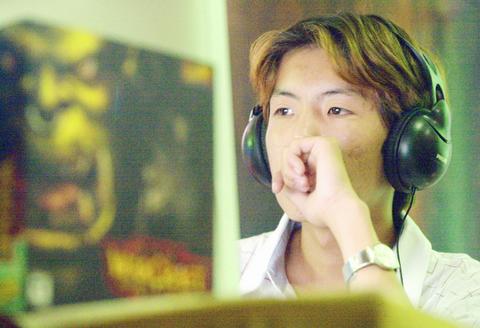The top South Korean cyber-game player of Age of Empires II -- the Conqueror (AOC), Kang Byung-geon, yesterday avenged his defeat at the hands of Taiwan's Tseng Jeng-cheng (曾政承) in last December's World Cyber Games (WCG) final in Seoul.
Tseng, nicknamed "Kitty Boy" (貓弟), was defeated in 37 minutes yesterday. He had crushed Kang in 28 minutes in Seoul to win the title.
Although Kang lost, he is still ranked as the world's No.1 player of AOC.

PHOTO: CHIANG YING-YING, TAIPEI TIMES
"I am angry at myself," he said in a depressed tone. "I knew I would lose today, because I haven't practiced for a long time. Even when I practiced, I did not really take it seriously."
Asked whether he is as determined as ever to participate in this year's WCG, Teng's simply said: "It depends."
Tseng did not deny media reports that suggested he had lost interest in cyber-gaming because of the heavy pressure after his earlier successes in the game, due to his fans' great expectation for victory at the next WCG.
He said he would not completely give up playing cyber-games, but would make his decision whether to participate in the next WCG only after some psychological adjustment.
In response to Tseng's remarks, Kang said: "That is nonsense."
Kang said if Tseng gave up before the next WCG, he would disappoint his fans.
Asked whether he would like to encounter Tseng in the coming WCG, Kang said: "Not particularly."
Tseng and Kang's showdown yesterday was viewed as the highlight of a two-day international exhibition organized by Internet service provider Hinet (
The two players' game drew an estimated 300 Taiwanese spectators, which surprised Louis Cheng (
"I had no idea the [Tseng-Kang] showdown would attract so many spectators," said Cheng.
Many WCG medalists from several countries were invited to take part in the weekend's exhibition matches, including Guillaume Party from Canada, Grospellier Bertrand from France and Lena Lee from South Korea.

WAITING GAME: The US has so far only offered a ‘best rate tariff,’ which officials assume is about 15 percent, the same as Japan, a person familiar with the matter said Taiwan and the US have completed “technical consultations” regarding tariffs and a finalized rate is expected to be released soon, Executive Yuan spokeswoman Michelle Lee (李慧芝) told a news conference yesterday, as a 90-day pause on US President Donald Trump’s “reciprocal” tariffs is set to expire today. The two countries have reached a “certain degree of consensus” on issues such as tariffs, nontariff trade barriers, trade facilitation, supply chain resilience and economic security, Lee said. They also discussed opportunities for cooperation, investment and procurement, she said. A joint statement is still being negotiated and would be released once the US government has made

Authorities have detained three former Taiwan Semiconductor Manufacturing Co (TMSC, 台積電) employees on suspicion of compromising classified technology used in making 2-nanometer chips, the Taiwan High Prosecutors’ Office said yesterday. Prosecutors are holding a former TSMC engineer surnamed Chen (陳) and two recently sacked TSMC engineers, including one person surnamed Wu (吳) in detention with restricted communication, following an investigation launched on July 25, a statement said. The announcement came a day after Nikkei Asia reported on the technology theft in an exclusive story, saying TSMC had fired two workers for contravening data rules on advanced chipmaking technology. Two-nanometer wafers are the most

NEW GEAR: On top of the new Tien Kung IV air defense missiles, the military is expected to place orders for a new combat vehicle next year for delivery in 2028 Mass production of Tien Kung IV (Sky Bow IV) missiles is expected to start next year, with plans to order 122 pods, the Ministry of National Defense’s (MND) latest list of regulated military material showed. The document said that the armed forces would obtain 46 pods of the air defense missiles next year and 76 pods the year after that. The Tien Kung IV is designed to intercept cruise missiles and ballistic missiles to an altitude of 70km, compared with the 60km maximum altitude achieved by the Missile Segment Enhancement variant of PAC-3 systems. A defense source said yesterday that the number of

Taiwanese exports to the US are to be subject to a 20 percent tariff starting on Thursday next week, according to an executive order signed by US President Donald Trump yesterday. The 20 percent levy was the same as the tariffs imposed on Vietnam, Sri Lanka and Bangladesh by Trump. It was higher than the tariffs imposed on Japan, South Korea and the EU (15 percent), as well as those on the Philippines (19 percent). A Taiwan official with knowledge of the matter said it is a "phased" tariff rate, and negotiations would continue. "Once negotiations conclude, Taiwan will obtain a better